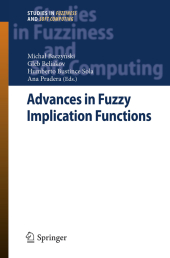 Neuerscheinungen 2015Stand: 2020-02-01 |
Schnellsuche
ISBN/Stichwort/Autor
|
Herderstraße 10
10625 Berlin
Tel.: 030 315 714 16
Fax 030 315 714 14
info@buchspektrum.de |

Michal Baczynski, Gleb Beliakov, Humberto Bustince Sola, Ana Pradera
(Beteiligte)
Advances in Fuzzy Implication Functions
Herausgegeben von Baczynski, Michal; Beliakov, Gleb; Bustince Sola, Humberto; Pradera, Ana
2013. 2015. vii, 209 S. 235 mm
Verlag/Jahr: SPRINGER, BERLIN; SPRINGER BERLIN HEIDELBERG 2015
ISBN: 3-642-43779-6 (3642437796)
Neue ISBN: 978-3-642-43779-3 (9783642437793)
Preis und Lieferzeit: Bitte klicken
This book presents state-of-the-art research on fuzzy implication functions, focusing on construction methods, on ways of generating new classes and on the common properties of implications and their dependencies. Includes discussion of open problems.
Fuzzy implication functions are one of the main operations in fuzzy logic. They generalize the classical implication, which takes values in the set {0,1}, to fuzzy logic, where the truth values belong to the unit interval [0,1]. These functions are not only fundamental for fuzzy logic systems, fuzzy control, approximate reasoning and expert systems, but they also play a significant role in mathematical fuzzy logic, in fuzzy mathematical morphology and image processing, in defining fuzzy subsethood measures and in solving fuzzy relational equations.
This volume collects 8 research papers on fuzzy implication functions.
Three articles focus on the construction methods, on different ways of generating new classes and on the common properties of implications and their dependencies. Two articles discuss implications defined on lattices, in particular implication functions in interval-valued fuzzy set theories. One paper summarizes the sufficient and necessary conditions of solutions for one distributivity equation of implication. The following paper analyzes compositions based on a binary operation and discusses the dependencies between the algebraic properties of this operation and the induced sup- composition. The last article discusses some open problems related to fuzzy implications, which have either been completely solved or those for which partial answers are known. These papers aim to present today´s state-of-the-art in this area.
An Overview of Construction Methods of Fuzzy Implications.- Fuzzy Implications: Classification and a New Class.- A Survey of the Distributivity of Implications over Continuous T-norms and the Simultaneous Satisfaction of the Contrapositive Symmetry.- Implication Functions in Interval-valued Fuzzy Set Theory.- (S;N)-Implications on Bounded Lattices.- Implication Functions Generated Using Functions of one Variable.- Compositions of Fuzzy Implications.- Fuzzy Implications: Some Recently Solved Problems.
From the reviews:
"The editors of this book have assembled a collection of eight papers from a select group of researchers. ... they provide relevant and useful information on the latest advances in the research area of fuzzy implication functions. ... The information in the papers requires experience with fuzzy logic, targeted at either the serious researcher or the expert practitioner well versed in fuzzy logic. For those readers, I highly recommend this book to augment their current study of fuzziness and soft computing." (Eric W. Yocam, Computing Reviews, September, 2013)


